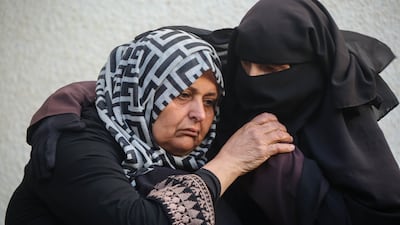Even after 100 days of the war in Gaza, there is no end in sight to the misery inflicted on Palestinians every day by the Israeli forces. Meantime, the fate of many Israeli hostages is unknown. In another 100 days, there is no telling how much the situation can worsen if this cycle of violence is allowed to continue.
Death, destruction, amputations, hunger and deprivation call on Gaza every day: at least 24,000 people have been killed since October, about 600,000 injured and hundreds of children now have to go through life with limbs missing. This is quite apart from Gaza's other deep wounds: 1.8 million people are displaced, their homes bombed and left uninhabitable, and 800,000 people are at the risk of starvation. By every measurable yardstick, the humanitarian situation is worsening.
There is no sensible argument for the fighting to go on. Israel's continued offensive is in pursuit of an unlikely goal: rooting out Hamas from the enclave in its entirety. This is, at best, an unrealistic objective that pays little heed to the series of catastrophic problems that are being set in motion as it attempts to accomplish it.
Just one of these is that in the long run, an entire generation of Palestinian children and youth witnessing homes being bombed and family members being killed could end up becoming radicalised, with many of them possibly joining armed resistance groups against Israel.
Few objective voices will disagree that there is a desperate need for a ceasefire and for adequate humanitarian aid to get through to Gaza. The release of the remaining Israeli hostages and thousands of Palestinian detainees must be brought back to the negotiating table and successfully mediated.
Into the fourth month of this war, as it was in the beginning, the only solution remains to examine more thoroughly the options and means to an enduring peace. But as of now, there is no post-war plan, and no prospect of it anywhere on the horizon. Israeli Prime Minister Benjamin Netanyahu has vowed that the fighting will continue even as the International Court of Justice last week heard South Africa's allegations against Israel of genocide and its acts in Gaza being "beyond any legal or humane justification".
One way out of the current war is for the US to substantially increase pressure on Israel to end the bombarding of Gaza. US Secretary of State Antony Blinken has since October 7 made four trips to the region. Even so, there is no guarantee that in another three months, we won't still be here, with the death toll possibly doubled and the demographics of Gaza completely altered. As we have seen in the past fortnight, fears of the conflict widening have been realised in Lebanon and in the Red Sea.
The conflict risks becoming even bigger and exacting a dearer-still human cost. Diplomacy on all fronts remains not only the best option but the only path to prevent the war from spreading further afield. And ultimately what is needed is ending the occupation and ensuring peaceful and secure existence for Palestinians and Israelis.
Follow the latest on the Israel-Gaza war

